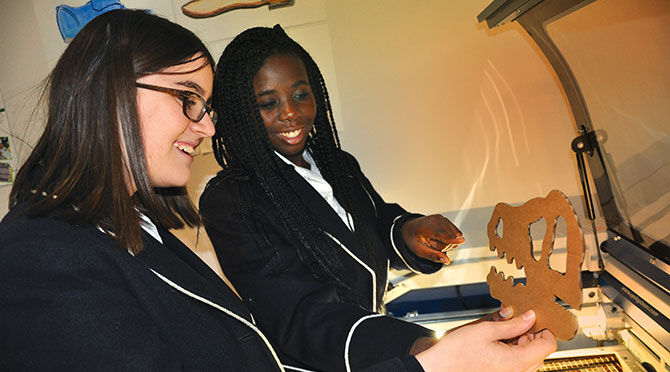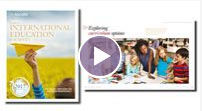Giving girls the digital bug
How can girls be encouraged to participate in shaping the digital world? Karin Purcell, of Marymount International School, explains how the school helps female students to become innovators in this field.
- Employers: Access the free digital guide here, or request a free print copy here
- Relocation professionals: Access the free digital guide here
- Parents: Access the free digital guide here, or purchase a print copy here
The digital world is real. Marc Andreessen’s famous assertion that “software is eating the world”, made in the Wall Street Journal, is true, and we now inhabit a planet where technology has become ubiquitous and embedded into every part of our lives.Industries are being turned inside out by digital disrupters. Marketing, sales, customer engagement, employee productivity and benchmarking are key business functions now defined by technology. Digital innovations are revolutionising engineering, medicine, product development and shopping habits.Family and friends stay connected, scheduled and entertained through social media and digital devices. Above all, young people being educated today are growing up as ‘digital natives’, aware of, and at ease with, connectivity, data, computing power, and the rapid pace of innovation no generation before them has ever experienced.Peter Diamandis is an engineer, physicist, and entrepreneur best known for being the founder and chairman of the X Prize Foundation and the co-founder and executive chairman of Singularity University – part university, part think tank, part business incubator. He predicts that, worldwide, three billion new minds will join the connected internet in the next five years. This represents an immensely powerful revolution!
The digital gender imbalance: how can schools help?
Upon closer examination, this recent tsunami of innovation has been almost entirely shaped by men. Google’s workforce is only 30 per cent female, which dictates that the technology being consumed by and shaping young minds is not the product of a balanced workforce. Similarly, 57 per cent of all bachelor’s degrees are earned by women, but – shockingly – only 12 per cent of computer science degrees are taken by women.This necessitates the question: are we sleepwalking into a world where this landscape is shaped by men? And can we afford to allow this next phase of innovation to be guided by a homogenous mindset, background or gender? Can schools do more, especially for girls, enabling them to be creative contributors, rather than passive recipients at the mercy of the “software [which] is eating the world”?Why are girls not excited about tech? After all, women are early adopters and keen consumers of technology. Women in Western countries use the internet 17 per cent more than their male counterparts.Giving girls confidence and skills in technology
It is clearly the responsibility of the education system to give girls the confidence and skills to join a world they need to be engaged with.As an all-girls school, Marymount International School has taken extra care to awaken an interest in technology, thereby breaking down gender-based stereotypes.The recent installation of a 'fab lab' (fabrication laboratory) as a ‘maker space’ for girls has given students unhindered access to an array of digitally driven instruments, such as 3D printers and laser cutters. This has naturally led to students developing an interest in coding, programming and robotics.As they have engaged with this space, students have been able to drive the programme and have been the key motivators in expanding their knowledge as well as exploring the possibilities of innovation and new ideas.Investment in digital technologies breeds success
It is, perhaps, no coincidence that recent graduates have gone on to study engineering and mathematics at both Oxbridge and Ivy League universities. But for those who wish to study languages, arts and humanities, digital skills are just as vital.As a Marymount alumna, who read philosophy, politics and economics at university and is now thriving in a global technology consultancy firm, says, “As a student at Marymount, I would never have predicted that I would end up working in the digital field. Luckily, the IB Diploma gave me a skillset that was sufficiently broad for me to move into the tech space. What would have been better is to have had exposure to coding, programming and digital learning at school.“The girls at Marymount today are extremely lucky and can hardly understand how crucial these skills are. Employers are crying out for women with tech skills, no matter what their chosen field of study.”By giving girls the ‘digital bug’ early, they will be able to participate fully in the next wave of innovation, and contribute positively to shaping the digital world.For more information about Marymount International School, follow the link.The Guide to International Education & Schools is designed to help relocating parents make informed education choices.
- Employers: Access the free digital guide here, or request a free print copy here
- Relocation professionals: Access the free digital guide here
- Parents: Access the free digital guide here, or purchase a print copy here
For related news and features, visit our Education & Schools section.Access hundreds of global services and suppliers in our Online Directory
 Get access to our free Global Mobility Toolkit
Get access to our free Global Mobility Toolkit  © 2017. This article first appeared in the 2016 edition of the Guide to International Education & Schools, published by Profile Locations, Spray Hill, Hastings Road, Lamberhurst, Kent TN3 8JB. All rights reserved. This publication (or any part thereof) may not be reproduced in any form without the prior written permission of Profile Locations. Profile Locations accepts no liability for the accuracy of the contents or any opinions expressed herein.
© 2017. This article first appeared in the 2016 edition of the Guide to International Education & Schools, published by Profile Locations, Spray Hill, Hastings Road, Lamberhurst, Kent TN3 8JB. All rights reserved. This publication (or any part thereof) may not be reproduced in any form without the prior written permission of Profile Locations. Profile Locations accepts no liability for the accuracy of the contents or any opinions expressed herein.










































